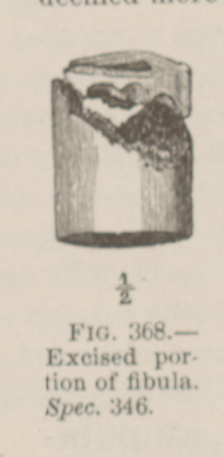Title: Peasley, C.
Source text: The Medical and Surgical History of the War of the Rebellion. (1861-65.), Part 3, Volume 2 (Washington, DC: Government Printing Office, 1883), 657-658.
Civil War Washington ID: med.d2e25001
TEI/XML: med.d2e25001.xml
CASE 991.—Excision in the bones of the leg.—Private C. Peasley, Co. A, 10th Massachusetts, was kicked by a mule in the left leg, fracturing both bones, while driving ambulance at Camp Brightwood, August 31, 1861. He was admitted to the Washington Infirmary Hospital on the day of the injury. One month after the accident no attempt at union of the bone had yet taken place, but much suppuration had occurred and the bone had become bare in its whole circumference for the space of two inches. Free incisions were made anteriorly and posteriorly and resection of the tibia and fibula was performed. Firm union resulted three months after the operation, a gypsum apparatus being used during the last month. The patient was discharged from service December 17, 1861, and sent home. He had urgently requested that amputation be performed, but on careful examination it was deemed more prudent to saw off the dead bone which had not yet been cast off and to resort to amputation only in case of failure of the resection. The excised portion of the tibia (Spec. 346), represented in the adjacent cut (FIG. 368), and measuring one and one-fourth inches in length, was contributed with the history of the case by Assistant Surgeon J. W. S. Gouley, U. S. A. The patient became a pensioner after receiving his discharge. Examining Surgeon H. D. Train, of Sheffield, Massachusetts, September 7, 1872, certified to the injury and resection, "shortening the limb three inches. There is a perfect solidification at the place of fracture; no motion of ankle and instep. After slight exertion or during damp weather he has often severe pain, which prevents any labor. Since his discharge he has been obliged to lead a sedentary life from inability to walk. His general health is fair, but his system is generally weakened and sensitive to cold weather. The foot is gradually perishing, and the pensioner would have been infinitely better off to-day if amputation had been performed." Five years later the same examiner reported that "since last examination spiculæ of bone were frequently discharged, the wound breaking out afresh. He cannot walk any distance without crutch or cane. General health poor." The pensioner was paid December 4, 1881.
